Why Is My Baby Constantly Moving While Sleeping?
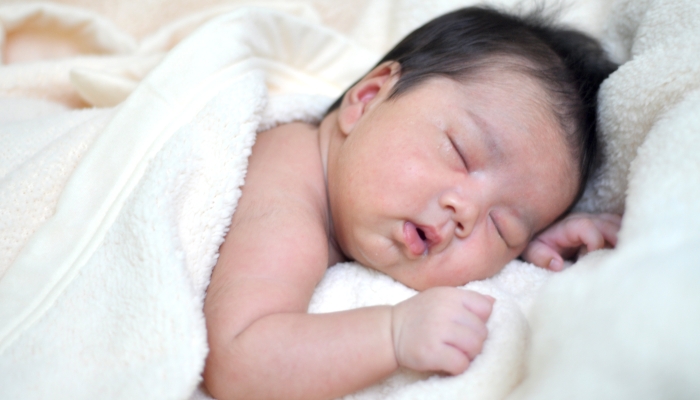
- Sleep is a necessary part of a healthy baby’s growth and development.
- Arm and leg movement during sleep is normal for most newborns.
- Avoid picking up your baby during restless sleep.
- There are ways to safely help your baby experience sound sleep.
“I slept like a baby last night!” Many people use this phrase to describe a night of sleeping soundly with minimal waking or interruption. The hope is to wake up well-rested and ready to tackle the new day.
However, if you’ve ever watched a baby or young child while they’re asleep, you might not want to “sleep like a baby.”
Infants and young children can be restless and often move during the night. Sometimes their activity causes them to wake, which at times will rouse their exhausted parents.
This cycle can happen frequently during the night, leaving everyone feeling less than refreshed.
In your quest to help your child experience quality sleep, you may wonder, “Why is my baby moving constantly while sleeping?” as well as, “What can I do to help my baby sleep more soundly?”
Learning what’s considered typical for a baby while they sleep will help set your mind at ease so that you can enjoy your own well-earned rest.
Why is Sleep Important For a Baby?
Have you ever wondered why babies sleep so much? According to The Sleep Foundation, a child’s mind is busy while it’s at rest.
During their time asleep, an infant’s brain works to consolidate memories, coordinate motor skill development and muscle control, store new data learned during play, and direct repairs to the body.
Sleep time is crucial for a healthy baby and enhances their development.

Baby Constantly Moving While Sleeping: Is It Normal?
Many new parents wonder if something is wrong with their infant when jerky movements occur or when infants are constantly moving during sleep.
Babies are born with an immature brain and nervous system. Sudden, random movement of arms and legs while asleep is considered normal during newborn sleep.
Though a child’s nervous system won’t be fully developed until they’re much older, these random movements will generally end after 3–6 months of age.
Do All Babies Move a Lot While Sleeping?
Most children do, in fact, move around a lot while asleep.
These movements (including moaning, crying out, squirming, noisy breathing, or rapid eye movement under closed eyelids) occur during active sleep.
Try not to worry—these brief movements are very common and usually are not a cause for concern.
Why Babies Move a Lot in Their Sleep
Did you know that there are different stages of sleep, or that they occur in cycles throughout the night? It’s true for adults and it’s also true for babies.
Stanford Children’s Health reports that sleep cycles change as your baby grows.
| Stage of Sleep | Symptoms Noted | Brain Activity | Breathing |
| REM sleep | Arms or legs may twitch Eyes may move | Busy | Can be irregular |
| Light sleep | Occasional movement | Less active | More regular |
| Quiet sleep | Body generally still | Quiet | Deep, regular |
Newborns normally have shorter sleep cycles, which is related to their need for feedings and diaper changes during the night.
Should You Pick up a Sleeping Baby Who Is Moving a Lot?
Though it appears logical to pick up your restless little one while they sleep, peer-reviewed studies, including a study published in Scientific Reports in 2021, recommend allowing them to continue to lay in their crib.
During a normal sleep cycle, babies spend time in REM sleep and quiet sleep.
Moving your baby while they are in restless sleep can actually wake your baby. When this disrupted sleep pattern happens over time, it can hinder a baby’s ability to fall back asleep on their own.

What to Do if Your Baby Moves a Lot While Sleeping
While sleep disorders aren’t common for babies, they do occur.
Some conditions that cause infants to be restless while they sleep include:
- Iron deficiency
- Night terrors
- Restless leg syndrome
- Periodic limb movement disorder
A sleep disorder should be officially diagnosed by a doctor. Contact your healthcare provider if you’re concerned about your infant and sleep problems.
Tips to Help Your Baby Sleep More Soundly and Still
If you’re longing for the time when your baby will sleep through the night, there are many ideas you can try to help your little one fall (and stay) asleep.
Be Patient
For approximately the first three months of life, newborns aren’t able to tell when it’s day or night. Their needs for food and sleep are consistent throughout a 24-hour period.
It may help you to know that most babies usually sleep through the night by the time they approach age one.
This repeated sleep/wake/feed cycle is necessary during the early days of infancy to help your baby grow to their healthy best and is completely normal.
Schedule Naps During the Day
Naps are important for babies to process and store information learned during play.
Daytime sleep is also important for exhausted parents in order to respond appropriately to their child’s needs in the middle of the night.
Helping your baby organize their wake windows and avoiding the pitfalls of being overtired can allow for better nighttime sleep for children and parents alike.
Set a Bedtime Routine
As your child grows, you can help your baby learn the rhythms of falling asleep by establishing a bedtime routine.
Individual bedtime routines may vary, but usually contain at least some of the following suggestions:
- Create a sleeping space that is dim, quiet, and cool. These elements are thought to help a baby enter a relaxed state.
- Put your baby to bed at approximately the same time each night. Doing so helps your baby’s brain learn circadian rhythms and makes it easier to fall asleep.
- Stay with the routine. A warm bath, story, snuggle, and song, done in the same order each night, will help signal the brain it’s time for rest.
- Keep it calm. Avoid active play as you ready your baby for sleep. Active play before bed signals the brain that it’s time to “wake up” and makes transitioning to sleep more difficult.
- Put your baby to bed awake. Help your baby sleep by putting them in their crib drowsy, but not fully asleep. This gives your baby a chance to settle, self-soothe, and fall asleep on their own.
- Maintain a safe sleep environment. Put your baby to bed lying on their back in their own crib or sleep space. Avoid loose bedding, such as blankets and crib sheets, as well as sleeping with your newborn in your bed.
Sleep routines are beneficial for a child of any age.
Try some (or all) of these suggestions in order to increase the amount of sound sleep for your baby.
Many parents are understandably concerned when they notice constant movement from their children while they’re asleep. Fortunately, such symptoms are generally considered normal, so everyone in the house can enjoy some much-needed rest.
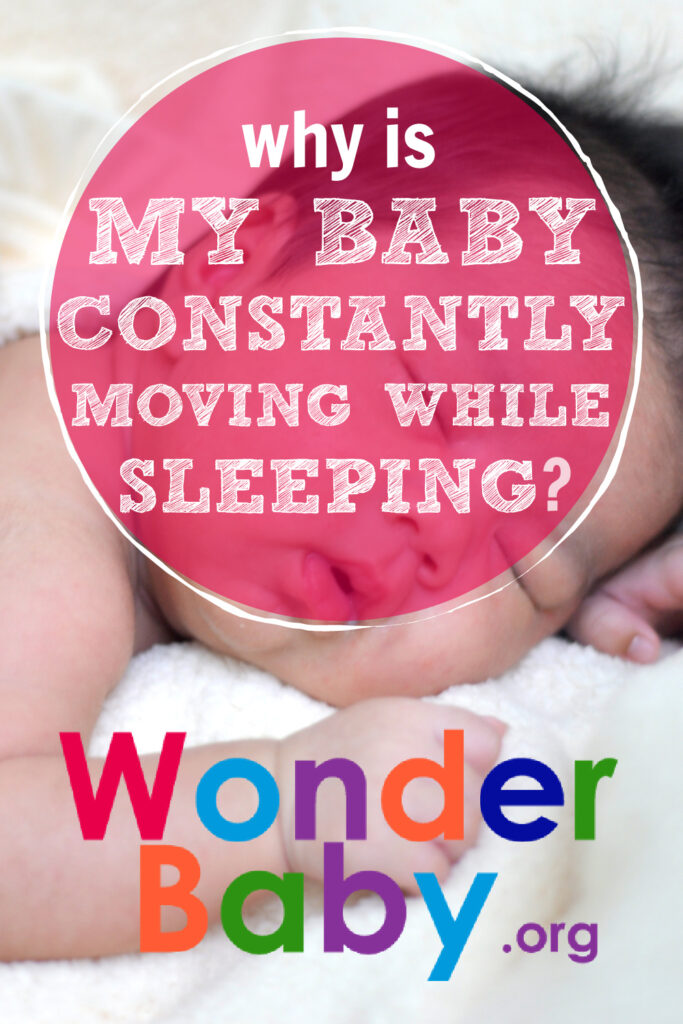
The information WonderBaby provides is not intended to be, and does not constitute, medical or other health advice or diagnosis and should not be used as such. Always consult with a qualified medical professional about your specific circumstances.
Related Posts
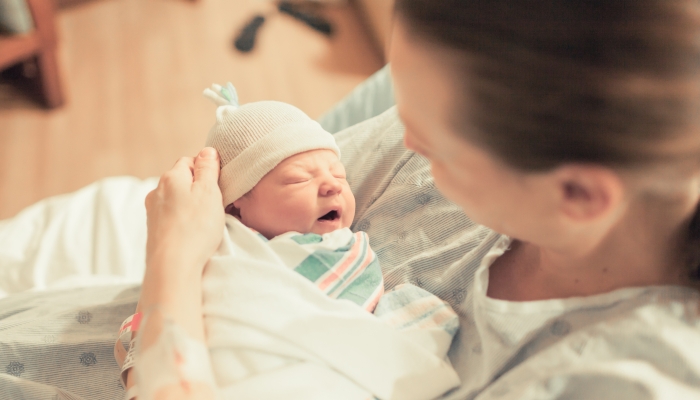
Sleep, Special Needs
Sleep Regimen for Premature Babies: Special Considerations
It can take premature babies much longer than their full-term peers to sleep for long stretches. A preemie sleep schedule may encourage better sleep.
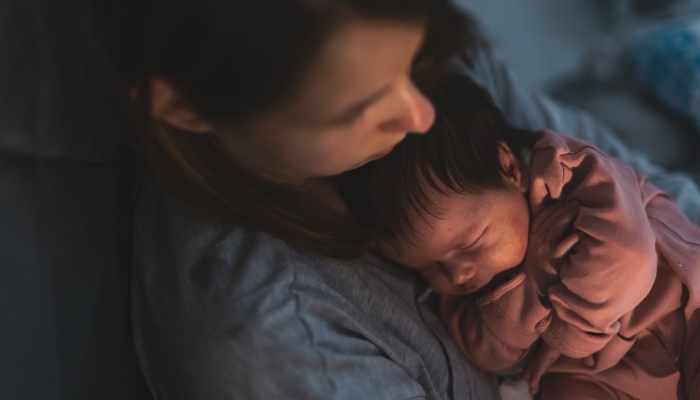
Sleep
Mastering the Bedtime Routine: 3 Tips for a Peaceful Night’s Sleep
From around six weeks, a newborn bedtime routine can help your baby learn the difference between day and night and prepare for a restful night’s sleep.
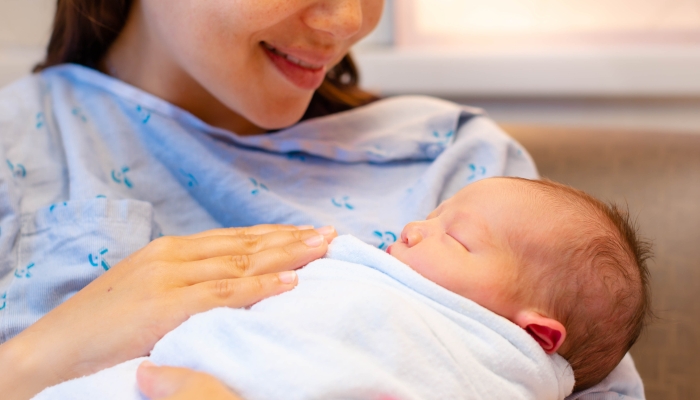
Sleep
4 Soothing Techniques for Fussy Sleepers: From Swaddling to White Noise
Is your newborn fussy at night? From gentle bedtime routines to soothing sounds, creating a tranquil environment helps newborn babies sleep peacefully.